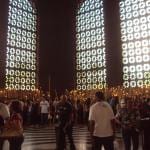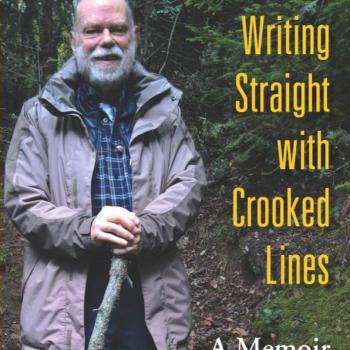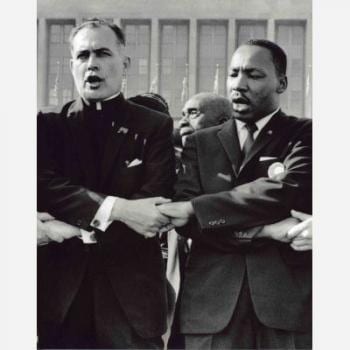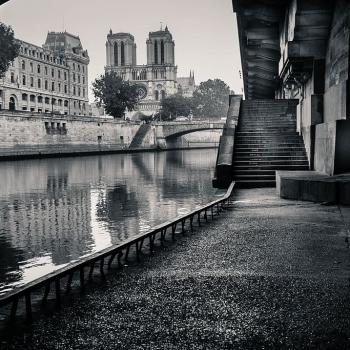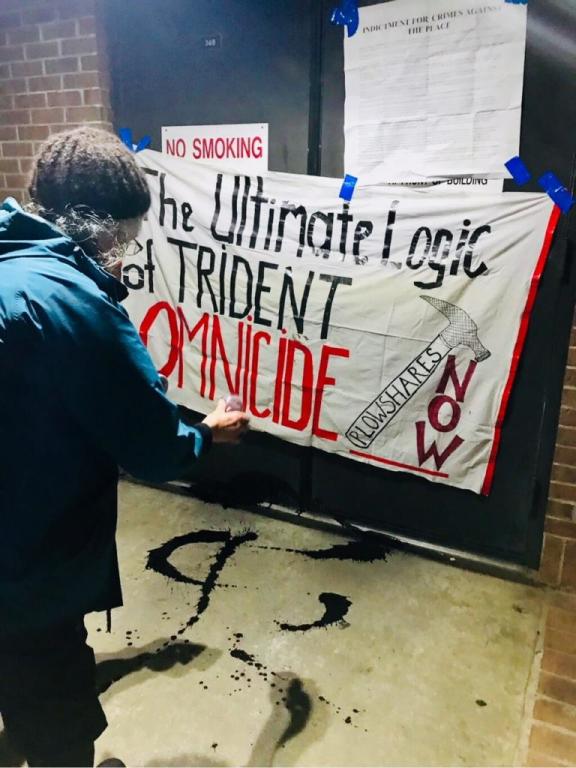
In less than two weeks, a group of seven Catholic peace activists will be put on trial in Georgia. The Kings Bay Plowshares 7, as they’re called, face 25 years in prison for nonviolently and symbolically “disarming” the submarine base on April 4, 2018, the 50th anniversary of the assassination of Martin Luther King, Jr.
Their target, as many probably do not know, was the largest nuclear submarine base in the world — the Kings Bay Naval Submarine Base in St. Mary’s, Georgia. It’s the site of six ballistic missile subs and two guided missile subs.
Carrying hammers and baby bottles of their own blood, the group went to three sites on the base: the SWFLANT administration building, the D5 Missile monument installation, and the nuclear weapons storage bunkers.
The activists — which included Dorothy Day’s granddaughter, Martha Hennessy — used crime scene tape to hang banners reading: “The ultimate logic of racism is genocide” (Dr. Martin Luther King), “The ultimate logic of Trident is omnicide”, and “Nuclear weapons: illegal/immoral.” They also brought an indictment document charging the U.S. government with crimes against peace.
Here’s a video of the group’s Pre-Action Statement, read by Patrick O’Neill and Martha Hennessy.
The website for the group’s defense notes that “this is the latest of 100 similar actions around the world, beginning in 1980 in King of Prussia, Pennsylvania.”
According the site, the activists at the nuclear weapons storage bunkers were Elizabeth McAlister, 78, of Jonah House, Baltimore; Fr. Steve Kelly SJ, 69, of the Bay Area, California; and Carmen Trotta, 55, of the New York Catholic Worker. At the Strategic Weapons Facility Atlantic Administration building were Clare Grady, 59, of the Ithaca Catholic Worker; and Martha Hennessy, 62, of the New York Catholic Worker.
I was alerted to this group and the global campaign to have the charges against them dropped by Rosalie Riegle, the wonderful oral historian of the Catholic Worker movement and herself an activist for non-violence (listen to our Dorothy’s Place interview with Rosalie here).
On the site, visitors can sign the petition on the activists’ behalf amidst some rather good company: Archbishop Desmond Tutu, Noam Chomsky, Daniel Ellsberg, Dr. Hanan Ashrawi, Rev. William Barber, and Fr. James Martin SJ, among many more.
I can already hear some readers: “Those crazy Catholic Worker people with their ‘non-violent’ actions,” some will say. “How is that kind of thing Catholic?”
In anticipation, I offer here some relevant quotes from the document “Nonviolence: a Style of Politics for Peace,” given on the World Day of Peace, January 1, 2017, by Pope Francis:
- “For Christians, nonviolence is not merely tactical behavior but a person’s way of being, the attitude of one who is so convinced of God’s love and power that he or she is not afraid to tackle evil with the weapons of truth and love alone. … The Gospel command to love your enemies is rightly considered the magna carta of Christian nonviolence. It does not consist in succumbing to evil … but in responding to evil with good, and thereby breaking the chain of injustice.” (Pope Benedict XVI)
- “This peaceful political transition [the fall of Communism, especially in Poland] was made possible in part by the non-violent commitment of people who, while always refusing to yield to the force of power, succeeded time after time in finding effective ways of bearing witness to the truth.” (Pope John Paul II)
Following upon that document was the April 4–5 meeting in Vatican City, co-hosted by Pax Christi International and the Vatican’s Dicastery for Promoting Integral Human Development. The 80 or so participating theologians, activists, and bishops expressed hope that a future papal encyclical or teaching document will reexamine the Church’s teachings on war.
The critique from a number of theologians argues against continued use of the “just war” theory in modern times, pointing out both the powerful capabilities of modern weapons and the growing evidence of the effectiveness of nonviolence in conflicts.
Which brings to mind the anecdote I heard about Dorothy Day when asked by an audience member at one of her talks about her views on just war. She replied tersely, “There is no such thing as a just war. There is just … war.”

